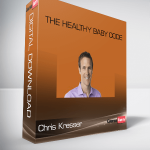Chris Kresser – The Healthy Baby Code
$29.90
Luckily, Chris Kresser has put in the time and effort – and has “test-driven” the process with his own healthy baby. As a result of his personal experience, clinical experience, and research, Kresser developed the designed to provide you with the most essential and reliable solutions for natural fertility
- Description
- Reviews (0)
Description

Chris Kresser – The Healthy Baby Code
Just because Melissa is pregnant doesn’t automatically turn us into baby-making (or raising) experts. We’ve done lots of research into the subject, of course, but haven’t put in the time or effort necessary to answer all of your questions about fertility, getting pregnant, having a healthy pregnancy, or raising a healthy baby.
(Frankly, we’re a little too busy growing a tiny human to devote 40 hours a week to research how to best create and grow a tiny human.)
But we’re not going to leave you hanging.
Get Chris Kresser – The Healthy Baby Code at the Course Farm
The Healthy Baby Code
Luckily, Chris Kresser has put in the time and effort – and has “test-driven” the process with his own healthy baby. As a result of his personal experience, clinical experience, and research, Kresser developed the designed to provide you with the most essential and reliable solutions for natural fertility, pregnancy and lifelong health for you and your baby.
We (Melissa and Dallas) used the to make sure we were doing everything we should to ensure a happy, healthy pregnancy – and even us Good Food veterans picked up some really excellent, practical tips. Of course, like with nutrition, there are no “one size fits all” specific recommendations that are perfect for everyone, but we’ve found Kresser’s Healthy Baby code to provide the best general foundation for fertility, pregnancy, and baby-raising.
On that note, we enlisted Kresser to give those interested in fertility and parenting his best answers to the most commonly asked baby-making and raising questions – questions asked by you (our readers) on the
We said we wouldn’t leave you hanging.
An Interview with Chris Kresser, L.Ac
Should my already healthy Paleo diet change significantly now that I’m pregnant?
It depends what you mean by “healthy Paleo diet.” Some nutrients that are crucial for reproductive health are not present in what many people consider a “typical” Paleo diet, i.e. one that is based on lean meat, vegetables, fruits, tubers and nuts.
Of course, these are all healthy foods and great choices during pregnancy, but without organ meats, bone broth, fattier-cuts of meat, fermented foods, grass-fed dairy (if tolerated), additional egg yolks, etc., your intake of important nutrients like fat-soluble vitamins (A & K2 in particular), glycine, choline and beneficial bacteria may not be sufficient.,
If I can’t eat eggs (because of an autoimmune issue, or an allergy/intolerance), how do I get healthy choline in my diet?
Beef, veal, and chicken liver are actually much higher in choline than egg yolks; this is another reason organ meats are so important for fertility, pregnancy and breastfeeding. Also, choline sufficiency is dependent on intake of folate, B12, B6 and betaine. This means that additional intake of these micronutrients can spare choline, i.e. perform its functions and reduce your dietary requirement of it.
Can I still consume raw dairy or fermented foods while I’m pregnant?
This is ultimately a personal decision and depends on your risk tolerance, health status, and values. As I’m sure you know, many mainstream organizations and midwives recommend against consumption of raw dairy, raw fish, or fermented foods during pregnancy.
However, these foods are rich in nutrients that are important during pregnancy – nutrients which are sometimes difficult to obtain elsewhere in the diet. The absolute risk of illness with these foods is extremely low, as I pointed out in my. (Your risk of developing an illness serious enough to require hospitalization from drinking raw milk is approximately 1 in 6 million.)
Your decision on raw milk and fermented foods should also depend on your source of these products. Do they come from a farmer or producer using best practices (i.e., are cows pastured and raised organically)? Do they have a good safety record? Do you feel confident in their integrity?
(Whole9 note: you’ll also not want to introduce raw dairy unless you are sure that you tolerate dairy proteins and carbohydrates well – the milk being raw doesn’t negate those potential issues. This is where a comes in handy.)
How can I manage food aversions during pregnancy?
Cravings and aversions during pregnancy are mysterious; no one is quite sure why they happen. Protein aversion is one of the most common I see in my work with pregnant women, and this can obviously be difficult for someone following a Paleo diet.
What I suggest in this case is to experiment with as many different types of animal protein as you can to see if there are some you tolerate better than others. For example, if you normally eat a lot of beef, lamb and pork, what about poultry and fish? What about more eggs? What about different ways of preparing those foods?
The good news is that most aversions pass or shift as pregnancy progresses, and there are often alternatives that can meet the same nutritional needs as the foods you are averse to. As long as your overall diet is rich in a wide spectrum of beneficial nutrients, you and your baby will be fine.
(Whole9 note: Melissa is working on an article to expand upon this answer, from her perspective. Stay tuned.)
Assuming I’m eating a diet of Good Food, what are the essential supplements you recommend for women trying to conceive? Does this change during pregnancy?
This one is unfortunately difficult to answer generically, because it depends on so many factors, including her current diet and health status. I cover this in considerable detail in the, but the nutrients you want to ensure adequate intake of (whether from food, supplements or both) are the fat-soluble vitamins (A, D & K), choline, glycine, folate, B12, biotin, and long-chain omega-3 fats.
What are the repercussions of a non-vaginal birth on the baby’s gut health? How should a woman best prepare for a C-section birth, for the baby’s health?
The initial colonization of the baby’s gut by bacteria occurs in the vaginal canal during birth. In a C-section, the first exposure to bacteria occurs in the hospital environment, which is obviously not ideal.
Epidemiological studies have shown that C-section babies are more likely to experience everything from obesity to autoimmune disease to allergies later in life. These studies can’t prove that C-sections caused an increased likelihood of these diseases, but there are other lines of evidence that make such a causal relationship plausible.
Breastfeeding after C-section is very important, because breast milk contains beneficial bacteria. I would also recommend an infant-specific probiotic like. Finally, skin-to-skin contact as quickly as possible after birth helps ensure successful breastfeeding, optimize the release of hormones important to the bonding process, and transfer beneficial bacteria from mother to baby.
What are your thoughts on vitamin K supplementation (for the baby) after an uncomplicated natural birth? Is vitamin K use ever truly warranted, and does the mother’s pre-natal diet have an impact on the “need” for additional K at birth?
The reason given for the vitamin K shot is to prevent hemorrhagic (bleeding) diseases in newborns. However, consider the following:
- Hemorrhage is extremely rare – occurring in approximately 1 in 10,000 live births – and this is especially true in uncomplicated births.
- An article as far back as 1977 in the journal Lancet challenged the necessity of vitamin K injections (Van Doorm J and Hemker H. Vitamin K deficiency in the newborn (letter). Lancet 1977;ii:708-9.) “We conclude that healthy babies, contrary to current beliefs, are not likely to have a vitamin K deficiency… the administration of vitamin K is not supported by our findings.” Several other peer-reviewed papers have since questioned the practice of routine vitamin K injections.
- It is highly unlikely from an evolutionary perspective that babies would be born deficient in such an important vitamin.
- The vitamin K administered by the hospital is in the synthetic phytonadione form, which is not well-utilized by the body.
- Plasma vitamin K levels in newborns after intramuscular injection reach almost 9,000 times the normal adult level. The consequences of this are currently unknown.
- The vitamin K injections contain a number of ingredients such as benzyl alcohol, phenol (derived from coal tar), propolene glycol (derived from petroleum and used as an antifreeze in hydraulic brake fluid) and acetic acid.
- Vitamin K injections have not been adequately tested for safety. The inserts of the Merck, Roche & Abbot vitamin K packets state: “Studies of carcinogenicity, mutagenesis or impairment of fertility have not been conducted with Vitamin K1 Injection (Phytonadione Injection, USP).”
My feeling is that the potential risks of the vitamin K shot aren’t justified by the low occurrence of hemorrhage, but ultimately this is a personal decision.
Does an exclusively breastfed newborn needed any supplements, if the mother’s nutrition is healthy? (Vitamin D3 supplementation, in particular?)
If the baby is getting some sun exposure (without sunblock!) and/or mom is consuming adequate vitamin D3, I don’t think supplementation is necessary.
What are your nutritional recommendations for mothers wanting to increase or promote breast milk production?
For most mothers, following a nutrient-dense, whole foods diet will be enough to ensure adequate milk supply. Those having trouble can try galactagogues (substances that increases milk production) such as alfalfa, fenugreek, blessed thistle or hops.
However, there are several non-nutritional strategies that should be explored as well. These include working with a lactation consultant to ensure the baby is nursing efficiently, nursing frequently, using breast compression, avoiding pacifiers and bottles, managing stress, and pumping.
You can find a lactation consultant in your area through the
What types of formulas would be recommended if a mother need to supplement breast milk or is unable to breastfeed? What role does the Weston-Price homemade baby formula have in this situation?
The first thing I’d suggest to mothers having trouble breastfeeding is contacting a lactation consultant, as I described in the last response. If that doesn’t work, consider a mother-to-mother milk share. There are now a few organizations connecting mothers willing to share extra milk and mothers who need milk.
(If you choose this arrangement, it’s of course ideal to find a mother who’s on a Paleo or similar nutrient-dense diet.) The next option would be a homemade formula as I describe in the, or as the advocates. (Note that I don’t support the non-dairy, liver based formula suggested by the Foundation because I believe it is too high in iron. But both the goat’s milk or cow’s milk version are excellent choices.)
I’d love to hear more about a Paleo/Good Food approach to introducing solids. What, when, and how?
I have an entire module on this subject in the . The also has some good information, although we differ on a few points. In general, I recommend exclusive breastfeeding for 6 months, and complementary breast milk (i.e. along with food) for at least 22 months. Many mothers choose to continue breastfeeding beyond 22 months, but the research is unclear on whether additional benefits accrue beyond that.
One key concept to keep in mind is that every baby is different. There are general guidelines that everyone should follow (i.e. fats and proteins are better tolerated initially than vegetables – young infants lack the enzymes required to completely break down the plant matter, whereas they do produce the necessary stomach acid to absorb protein and fat), but within those guidelines there’s a lot of room for individual variation.
How can I naturally increase necessary hormone levels, repair my body, and give myself the best chances for getting pregnant naturally or using IVF?
Following a nutrient-dense diet and the recommendations I’ve made here and in the is the most important thing you can do. Stress management and exercise are also crucial. If you are following a healthy diet and lifestyle and still having trouble conceiving, you may need additional testing and treatment from a clinician that is skilled with hormone balancing and reproductive medicine. Try / to find a practitioner skilled in this kind of testing and treatment in your area. (Note: I cannot vouch for any practitioners on that list, nor am I affiliated with FDN in any way.)
Whole9 note: We could also recommend seeking a functional medicine practitioner for testing and evaluation. Find one here:.)




Reviews
There are no reviews yet.